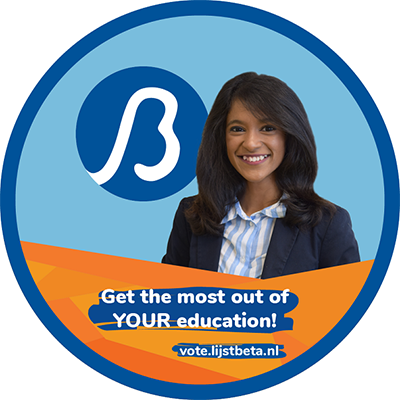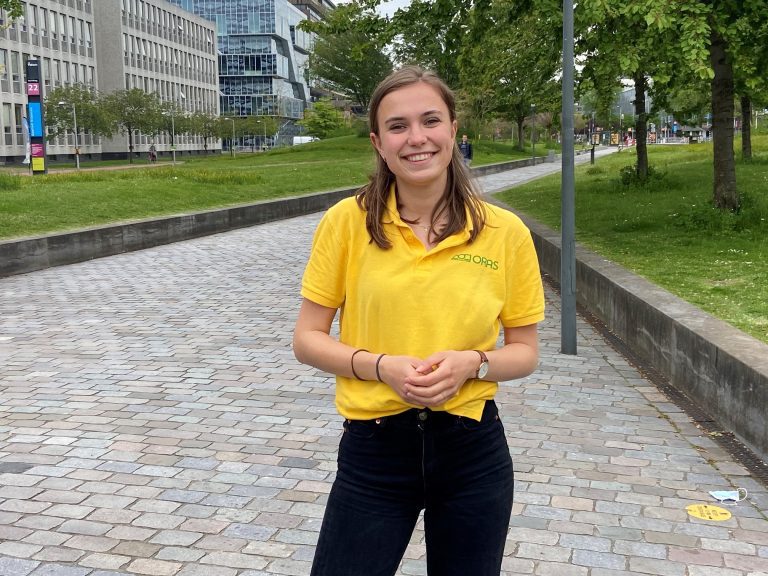Well-being, course evaluations and sustainability. In the run-up to the elections on 2 and 3 June, Delta spoke with Oras and Lijst Bèta about pressing issues at TU Delft.
The elections of the members of the Student Council will take place on 2 and 3 June. (Photo: Marjolein van der Veldt)
With the corona measures still in place, the Student Council election campaign is once again mostly online. To find out more about the linchpins of the two parties, we asked TU Delft students to submit questions to top candidates Lotte Kuiper (Oras) and Saraf Nawar (Lijst Bèta). This is their take on topics such as developing soft skills, mental health and the visibility of the Student Council.
To start off, what are the biggest differences between Oras and Lijst Bèta?
Lotte: “Oras focuses on three main issues: education, facilities and personal development. Personal development especially is a topic in which we differ from Lijst Bèta. We believe that it’s important to not only develop yourself through your studies, but also through extracurricular activities.”
Saraf: “At the end of the day, as a central student council we work together. But it’s important to highlight the differences. Lijst Bèta has two international students in the top four on the list this year. This gives us a diverse and international basis from which to represent all students. Besides that, sustainability is also one of our most important points. We want to improve sustainability, not only on campus but also in terms of education and finances.”
If you are selected, what are the first issues you will tackle?
Saraf: “During these times of corona there has been rising concern for student well-being. The Student Council has been actively involved, but there is still much room for improvement. I would really focus on this. Also, it’s very important that not only students on boards or committees can reach the Student Council, but that everyone can. How can we improve our communication and show the importance of the Student Council?”
‘I would focus on a smooth transition from online to on-campus education’
Lotte: “There are three things that I find important. Firstly, I want to tackle the shortage of study places. Secondly, I want to improve online education. After corona, online education will probably still be a big part of the work around at TU Delft. I’ve noticed that professors sometimes struggle to work with MS Teams or Zoom. I would make sure everyone knows how to use these tools as best they can, but also to get everyone to work on a central platform. We are now constantly switching between MS Teams, Zoom and Brightspace, and that is confusing. Lastly, I would focus on a smooth transition from online to on-campus education.”
How can the study climate at TU Delft be benefited?
Saraf: “There are a lot of tools, but many students are unaware of what is available. It’s important to inform students about these tools. Besides that, I think that we as TU Delft students need to realise that the world is bigger than just our campus. It’s important to be aware of what is going on outside.”
Lotte: “By giving students more space for personal development. This year Oras tried to do that by lowering the binding study advice (BSA) and by initiating the zachte knip. These measures allow students to develop next to their studies.”

“I’m an international student from Bangladesh who’s been living in the Netherlands for almost four years now. I’ve been involved with different student organisations like the TU Delft Energy Club, Students 4 Sustainability and this year I’m the Chair of GreenTU, the Sustainability Board of TU Delft. I see my candidacy for Lijst Bèta as a way to focus on education, diversity and inclusion, student well-being and sustainability. The Student Council would be the perfect platform for me to step up and represent all students at TU Delft.”
How can you improve inclusivity at TU Delft?
Lotte: “By making sure all voices are heard. That’s why Oras created InterDelft, the umbrella organisation of all international student associations. We have weekly meetings with them to talk about the concerns of the international community. We share their input directly with the TU Delft Executive Board. We want to make sure their needs are included”
Saraf: “With two internationals on board I think it’s a little bit easier for us to voice the concerns of the international student community. But inclusion is not only about international students, but about creating a safe environment for the whole TU Delft population. We have been working towards improving multicultural communication throughout TU Delft. Lijst Bèta is setting up Diversity & Inclusion teams at all faculties and stays in close contact with the Diversity Officer. We have regular meetings with the teams to stay up to date about issues that occur in their faculties.”
What steps should be taken to better support students’ mental health?
Saraf: “A lot is already being done, but there is room for improvement. We need to do something about the long waiting lists and about communication problems due to language issues.”
Lotte: “We need to create awareness, so that the right help is available at the right time. The whole Student Council, Lijst Beta and Oras, have been working on this together. We are creating a roadmap on which students can find out where and how to get help as this is still largely unknown.”
Should education at TU Delft increase its focus on soft skills at the cost of specialised knowledge?
Lotte: “Increasing soft skills at TU Delft is really important. Soft skills are essential to become the best engineer, though I do not think they should ever outweigh specialised knowledge. Students should be free to develop their soft skills flexibly. I think TU Delft should encourage students more to do something besides their studies so that they develop those soft skills.”
‘Recognise professors for their contributions to sustainability’
Saraf: “At the end of the day we are a technical university, but we often hear that TU Delft engineers only think of solutions and don’t know how to work in teams. Communicating in a team and looking beyond just the solution are important skills to integrate in studies as well. Of course specialised knowledge is inherent to TU Delft, so striking a balance is important.”
Should course evaluations stay anonymous?
Saraf: “If privacy is a concern, it should. If evaluations are not anonymous, students might feel unsafe to provide input.”
Lotte: “I agree, if your name is out in the open you are more hesitant to say what you think. Anonymous evaluations are a good way to give feedback. However, to minimise hateful comments in anonymous evaluations, study associations could serve as a ‘go-between’. They can collect opinions face-to-face and give that feedback to the professors.
Saraf: “I agree with Lotte, study associations are a good place to gather more information on the problem that might lie behind certain criticisms.”
- Also read: The lecturer as a target
What’s your party’s vision on campus sustainability?
Saraf: “Lijst Bèta values sustainability highly and it’s one of our pillars. We are currently working with GreenTU on a project called Groene Draad. It’s a project where we integrate sustainability in bachelor and master courses. In the future, we would like to recognise professors for their contributions to sustainability in the curricula. Sustainability on campus is important, but we want to look further than just facilities. We also want to look into education, finances etcetera.”
Lotte: “Sustainability is the future. As a TU Delft engineer especially, you need to know how to incorporate it. Oras is helping the campus to become more sustainable, for example through climate neutral printing and recycling coffee cups. And on top of that we are making the catering at TU Delft more sustainable.”

“Right now I’m finishing up my bachelor’s. I am a member of the C.S.R. student association and work at the Science Centre. Last yearm I was involved in the Oras committee responsible for organising the campaign, and I discovered how important the Student Council is. It represents all TU Delft students and plays a big part in voicing their problems. For me the Student Council would allow me to develop new skills while making an impact for fellow students.”
Heb je een vraag of opmerking over dit artikel?
m.vanderveldt@tudelft.nl


Comments are closed.